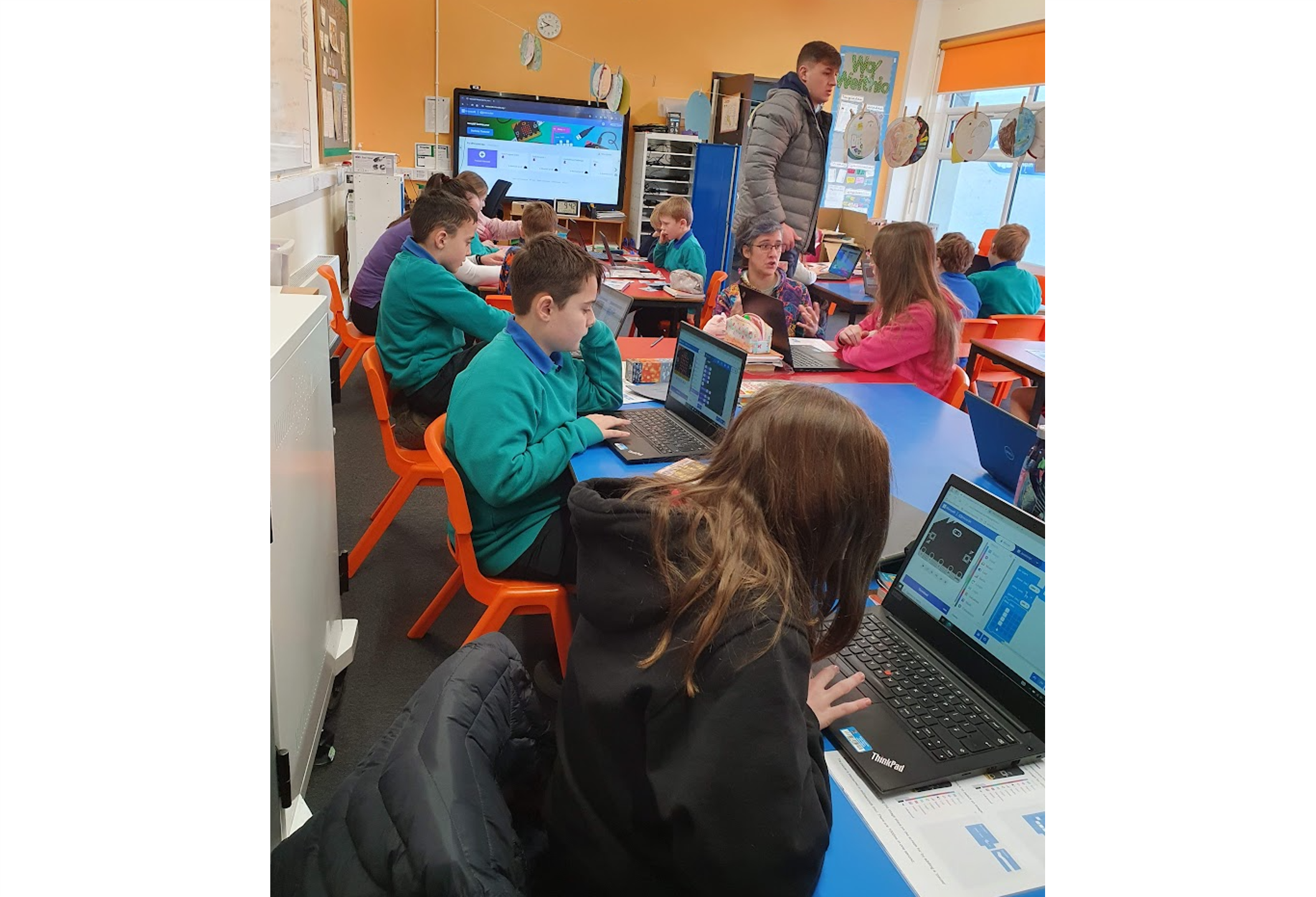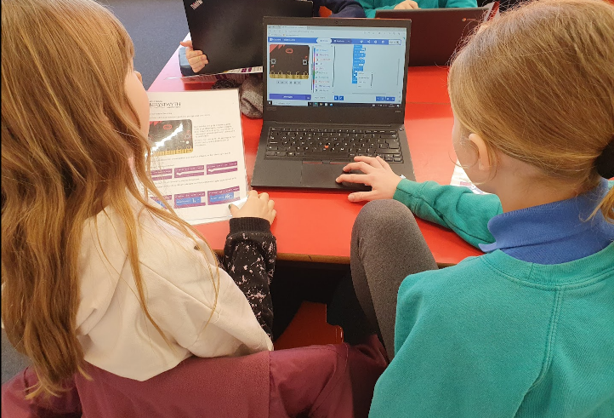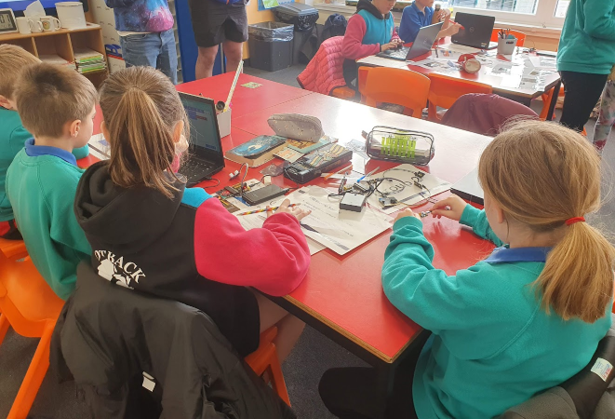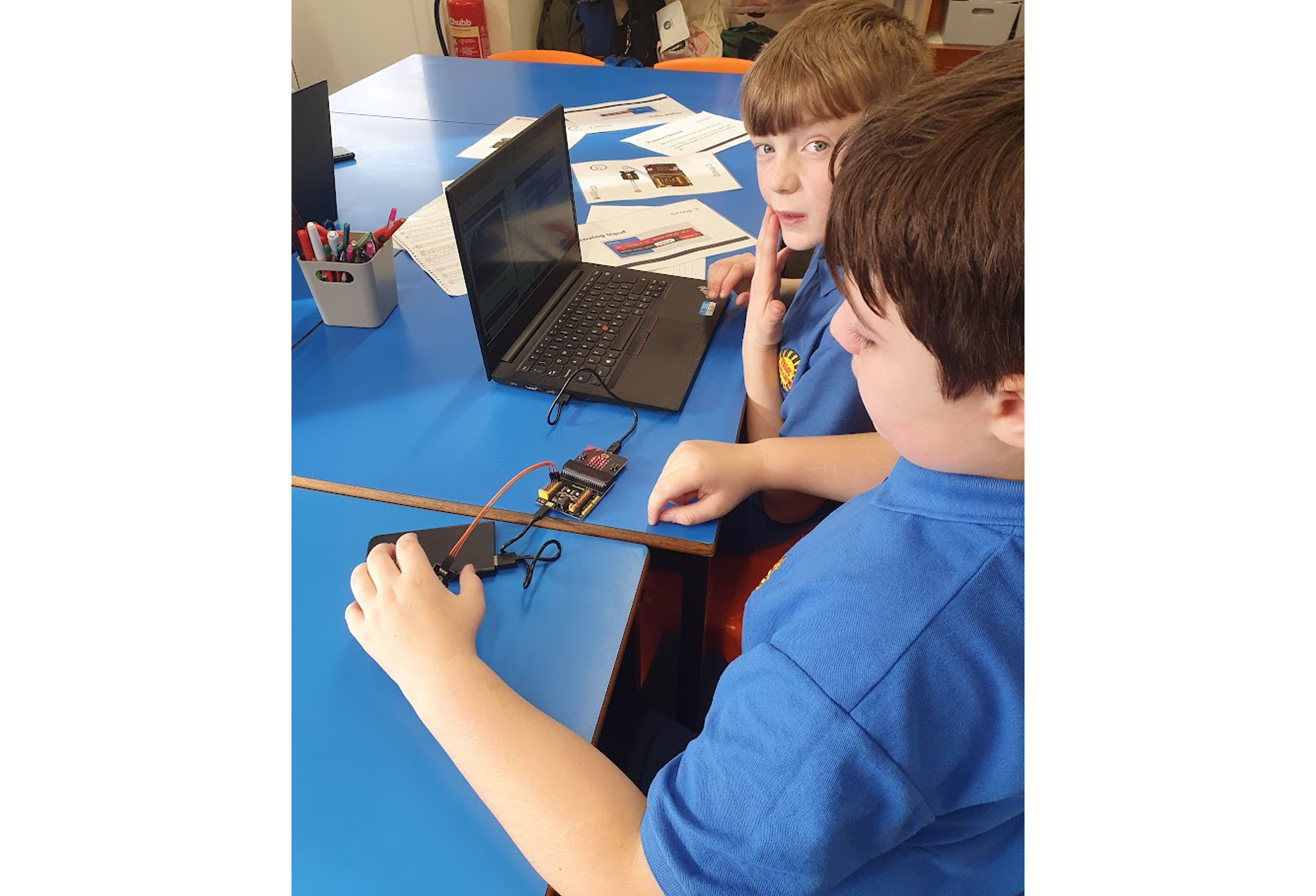The Ysgol Penrhyn-coch and Ysgol Penllwyn Federation successfully applied for a Partnership Grant from The Royal Society to undertake a project entitled:
How can Micro:Bits be used to understand and improve plant growth efficiency within an automated greenhouse.
The application relied on securing a STEM partner in research and/or industry. Our very own Dr Patricia Shaw, a Senior Lecturer, the head of our Intelligent Robotics Research Group, and winner of the UK-RAS Community Award 2023, volunteered.
With help and support from our Faculty Outreach Officer, Tally Roberts, we are adapting, developing, and delivering a variety of sessions over the spring and summer terms of 2024.
You can follow our progress here. For anyone interested in conducting a similar project, we have also provided links to resources.
Select a session heading to get started.
We visited both schools on Monday 15th of January 2024 to run an adaptation of our Introduction to Micro:Bits workshop.


Sessions one and two of our online Micro:Bit Workshop Series include recorded versions of the same material in more depth. There are also additional exercises (with hints and answers) to consolidate learning.
We shortly hope to update our BBC Micro:Bit Programming for Educators webpage to include the newer version of the Makecode Classroom software.
The Makecode website includes a number of tutorials which guide users through how to create different programs.
The Micro:Bit Educational Foundation have created a selection of Micro:Bit Classroom Resources for teachers. Everything from lesson plans through to posters.
Technocamps have also produced resources to get learners started with the Micro:Bit with a selection of projects. Their resources are available to all school children in Wales through Hwb.gov.uk.
We visited the primary schools again during the week commencing 29th January 2024. For this session we ran a sensor circus activity.


After delivering the teaching material, we divided the class into 5 groups. Each group had a selection of different components, the relevant description cards, wiring diagrams, and the programs required to test them.
The aim is to match the component to the correct wiring diagram, then use the provided programs to test them, in the hope of then matching them to the correct description. After 15-20 minutes we moved the groups around the room to the next table and set of components.
We included 24 components and asked teams to identify them and record their results in a table.
We had a range of success between the teams - identifying between 3 and 16 components.
We would recommend learners first visit our Micro:Bit Series Session Four video and exercises. This will cover more information about variables and using the pins on the Micro:Bit.
There is no recording or online version of this material (yet). However, here is the Sensor Circus presentation we used to guide the talk.
The wiring diagrams and example programs we used, were adapted from Keyestudio's online guide for their 37-in-1 Starter Kit.
You can download our Answer Pack here. This combines the wiring diagrams with their description cards including additional information, and ends with the completed results table.
For additional material on electronics with Micro:Bits, you can visit sessions one to three of our Online Electronics Series. There is also an Educators Guide to Tinkercad available - this is the software used for our online electronics content.
We hosted this session on how to plan an experiment at both primary schools on Monday 5th February 2024.
This provided us the opportunity to give the class groups their plant-based experiment.
As the aim of this project is to introduce some form of automation to their school greenhouses/polytunnels. The classes need to investigate what makes plants grow healthily and have some sensor readings to accompany the results for their later engineering designs.
We have divided each class into 5 groups and given each of these groups an experiment to carry out.
These experiments will be run in the schools for 3-4 weeks, with sensor readings being taken every school day.
We have put together an Plant Experiment Pack for the 5 investigations each class are undertaking. This includes the equipment we'd recommend, methodologies, example results tables, and Makecode sensor programs.
We hosted this session on results and analysis on Monday 18th March 2024.
This session requires learners to have access to pencils and rulers (with millimetres). Calculators are optional - there are some long divisions resulting in decimals.
One key lesson learned from this attempting to run this experiment in schools, would be to choose the time of year more carefully. The weather was too cold for the seeds to grow in the short time frame provided.
Thankfully, Dr Patricia Shaw ran a parallel set of experiments in an easier to control environment in one of our University Laboratories.
Click the link to view our results tables (pdf).
We returned to the schools after the Easter break to introduce some new components available to them for their greenhouse designs.
Unfortunately, there is no recording or presentation available for this session.
We have an alternative activity for the radio communications available in our Micro:Bit Workshop Series Session Three: Communicating between Micro:Bits.
The wiring diagrams and example programs we used for these new components, were adapted from Keyestudio's online guide for their 37-in-1 Starter Kit.
This session was hosted at both schools on Monday 22nd April.
The aim of this activity is to provide learners with new design skills using Tinkercad classroom software.
For teachers: Tinkercad offers classroom facilities - this means that only you will be required to log in to the software. For more guidance on how to use this software, please see our Educators Guide to Tinkercad Circuits - 3d design uses the exact same classroom function.
Activity One: Shape Challenge Worksheet.
Activity Two: Rocket Building Instructions.
We returned to the schools on Monday 13th May to provide some guidance and information on different methods of presenting a design.
We do not have any recordings of this session. However, here are the slides for our introduction to Giving a Presentation.
The rest of the session involved working with each group to help them establish roles and content.
Pupils from both schools delivered their design presentations to a judging panel made up of Dr Patricia Shaw, Dr Helen Miles, and Dr Tomos Fearn on Monday 20th May.
The amount of effort and enthusiasm displayed during these sessions made judging the designs very difficult. The key aspect for the judging panel was the feasibility of the designs presented as we shall be working on implementing them over the next few weeks.
In Ysgol Penllwyn, they shall be setting up two system designs, one with manual watering, while the other is automated.
In Ysgol Penrhyn-coch, the final design is a merging of the two best presentations, adapting aspects of both.
After half-term, everyone will be involved in the implementation of the winning designs, with our volunteer staff returning to assist with the electronics to help get them started.
To assist with the implementation of each school's design(s), we returned on the 4th June.
We provided technical support - helping with wiring, programming and component set up.
For the two designs incorporating water pumps, it was necessary to extend the wire connections to increase the distance from the water pump to the Micro:Bit. We also installed 'barbed irrigation tee-connectors' along the piping, one every 20-30cm.
On the 10th of June, we invited all the pupils involved to visit Aberystwyth University's Penglais Campus.
We arranged tours of our Intelligent Systems Laboratory, Planetary Analogue Terrain Laboratory, Robotics Workshop, and Smart Home Laboratory.
Afterwards, a number of our university staff volunteered their time to meet the children and answer questions about their job, research, and/or education.
The pupils interviewed:
Dr Amanda ClareDr Patricia Shaw and Tally Roberts returned to the schools to give a final assist in the installation and testing of the completed greenhouse systems.
This involved some last minute wire length alterations (to give the soil moisture sensors more reach from the breakout boards), some debugging of code, and circuit checks.
Once installed in the greenhouses, we helped the pupils test their systems and ensured they were all working as expected.
As an end of project bonus, Dr Patricia Shaw arranged for the schools to both visit Aberystwyth University's National Plant Phenomics Centre in Gogerddan.
Dr Fiona Corke, the Smarthouse Manager at the National Plant Phenomics Centre, organised tours and activities for the pupils to participate in.
Children had the chance to see a large scale automated greenhouse, find out about about plant foods, peat, microscopy, thermal imaging, and make their own 'grass head' to take home as a souvenir.
Ysgol Penllwyn were joined by the BBC's Craig Duggan. Several staff and pupils were interviewed during the visit to the Phenomics Centre and Craig was invited over to the school afterwards to see their project in action. The interviews featured on S4C's Newyddion a Chwareon (Sunday 14th July), on BBC Radio Cymru's Dros Frecwast (Monday 15th July), and as an article on BBC Cymru Fyw.